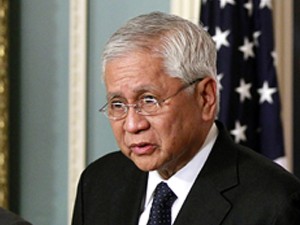Del Rosario urges China to be ‘a responsible and positive force’
MANILA, Philippines – Warning that escalating tensions in the West Philippine Sea (South China Sea) “could lead to conflict,” Foreign Secretary Albert del Rosario urged China at a foreign policy forum in Tokyo to act responsibly instead of resorting to aggression in the wake of its its rapid rise as an economic and military power in the Asia-Pacific.
In his speech at the Tokyo forum on Thursday, Del Rosario reiterated the Philippines’ pursuit of peace in trying to settle its conflict with China over disputed waters in a part of the China Sea that the Manila government refers to as the West Philippine Sea, a dispute highlighted this month by the deployment of Chinese military vessels within the Philippines’ exclusive economic zone.
The text of his speech was released by the foreign office here.
“China, as the second biggest economy in the world with a position of primacy in the region, is very important to the security and prosperity equation in Asia. We must all support China’s peaceful rise and hope that China will firmly pursue the track of being a responsible power and a positive force,” Del Rosario said.
“Being a responsible power, however, is not without its challenges. The competing territorial and maritime disputes are causing considerable tension that could lead to conflict,” he said at the 19th Nikkei Future of Asia Conference, considered the region’s premier foreign policy forum gathering Asian ministers and other officials at the Japanese capital on Thursday.
The Philippines’ top diplomat noted how the region continues to find a balance toward peace and security amid China’s rise, saying that, on the contrary, the presence of the United States, a long-established world power, “has had a stabilizing effect” on Asia and the Pacific for decades.
“The rise of new powers has certainly added a new dimension to the geopolitics of Asia and the Pacific. Increasingly relevant to this complex equation is China’s growing economic network in the region, its rapid military build-up and its development of blue ocean capabilities. The region, it seems, is still finding the right equilibrium that would ensure long-term peace and security,” Del Rosario said.
In the face of an aggressive China, Del Rosario said, the Philippines continued treading the path of peace in hopes of settling the dispute without the use of arms. He said Manila was batting for “diplomacy and peace over conflict,” and a “just and durable” solution to the dispute based on international law.
He explained that the Philippines haled China to the United Nations arbitral panel after pursuing other avenues “to no avail.”
“Under these circumstances therefore, we must find a durable solution based on international law, or else the status quo will favor military and economic might, and diplomacy will veer toward appeasement. And as we all know, appeasement undermines any attempt to build a system based on equity and rules. Rather than being forced to accept that might is right, we want to show that right is might,” Del Rosario said.
Filed in January, the Philippine action seeks to clarify Manila’s and Beijing’s maritime entitlements in the West Philippine Sea, stop Chinese incursions into the Philippines’ exclusive economic zone and nullify China’s “nine-dash line” claim over the waters. China has rejected the proceedings but the legal process will continue.
“Our arbitration case against China’s over-extended claim represents a choice the world needs to ponder as regards the future order it seeks for itself – either an international system that is largely dominated by force, or one that is significantly characterized by the rule of law,” Del Rosario said. “Through this case, we also seek an end to the pattern of unlawful, increasingly aggressive assertion based on the threat of use of force, which has prevented us and other littoral states from the lawful exercise of our maritime rights and entitlements within our legitimate maritime zones.”
The Philippines this month protested China’s deployment of a warship and two maritime surveillance vessels along with several fishing vessels around the Ayungin Shoal (Re’nai Reef for the Chinese), located some 105 nautical miles or 196 kms off Palawan (roughly the distance between Manila and Pangasinan), well within the country’s EEZ.
Responding to the diplomatic protest, the Chinese Foreign Ministry said China was reiterating its “indisputable sovereignty” over the waters and said patrolling the territories was well within its right.
“The Ren’ai Reef is part of the Nansha Islands (Spratlys). China has indisputable sovereignty over the Nansha Islands and their adjacent waters. It is beyond reproach that Chinese government vessels carry out normal patrol in relevant waters,” said Chinese Foreign Ministry spokesperson Hong Lei in a press conference in Beijing on Wednesday.
For comprehensive coverage, in-depth analysis, visit our special page for West Philippine Sea updates. Stay informed with articles, videos, and expert opinions.
